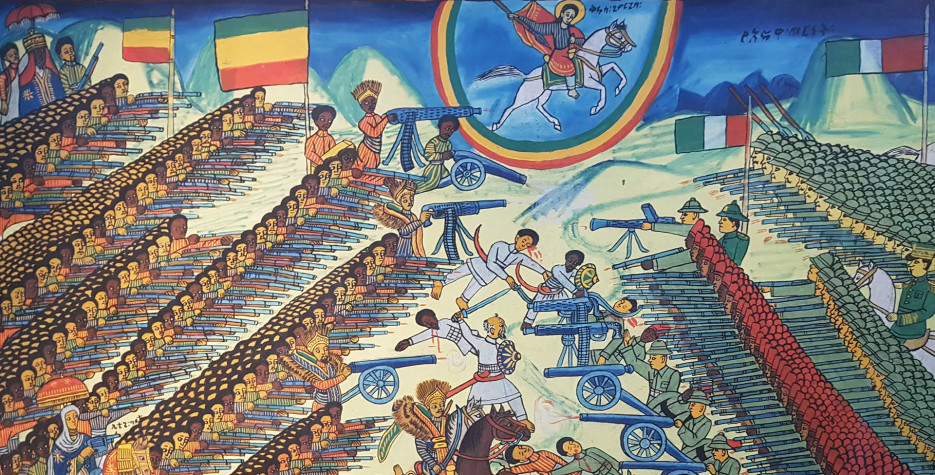 |
| Ethiopian painting depicting the Battle of Adwa. Image by Unknown , via British Museum |
Ethiopia is a country in the Horn of Africa with a long and complex history. It is one of the oldest continuous civilizations in the world, with a recorded history that stretches back over 3,000 years.
Ethiopia was never fully colonized by European powers, unlike many other African countries. However, it did experience significant foreign intervention and influence, particularly during the 19th and early 20th centuries.
In the late 19th century, Ethiopia was invaded by Italy, which sought to establish a colonial presence in the country. The Italians were eventually defeated by Ethiopian forces, led by Emperor Menelik II, in the 1896 Battle of Adwa. This marked the first time that an African country had successfully defended itself against a European colonial power.
The Battle of Adwa was a military conflict that took place in 1896 in the Ethiopian Empire (present-day Ethiopia). It was fought between the Ethiopian Empire, which was led by Emperor Menelik II, and the Kingdom of Italy, which was seeking to establish a colonial presence in Ethiopia.
The battle was a decisive victory for the Ethiopian Empire, and it marked the first time that an African country had successfully defended itself against a European colonial power. It was a major turning point in the history of Ethiopia and had significant consequences for the country's relations with Europe and the rest of the world.
The Italian forces, which were led by General Oreste Baratieri, invaded Ethiopia from Eritrea in 1895, seeking to annex the country. The Ethiopian forces, which were made up of a mix of regular soldiers and local volunteers, were initially outnumbered and outgunned by the Italian military. However, they were able to hold their ground and eventually inflict significant losses on the Italian forces.
The decisive moment of the battle came on March 1, 1896, when the Ethiopian forces launched a surprise attack on the Italian camp at Adwa. The attack caught the Italians off guard and led to their defeat. The Ethiopian Empire emerged victorious, and the Treaty of Wuchale, which had recognized Italy's claim to Ethiopia, was declared null and void.
The Battle of Adwa had significant consequences for the future of Ethiopia and the rest of Africa. It established Ethiopia as a sovereign state and helped to prevent the country from being colonized by European powers. It also served as an inspiration to other African countries and contributed to the rise of Pan-Africanism, a movement that sought to promote the rights and interests of people of African descent around the world.
In the early 20th century, Ethiopia experienced further foreign intervention, including an invasion by fascist Italy in 1935. Ethiopia was eventually able to defeat the Italian invaders and gain its independence, but the country was significantly weakened by the conflict.
The Second Italo-Ethiopian War, also known as the Ethiopian-Italian War, was a conflict that took place in East Africa from 1935 to 1936. It was fought between the Kingdom of Italy, which sought to establish a colonial presence in Ethiopia, and the Ethiopian Empire, which sought to defend its independence.
The war began in October 1935, when Italian forces invaded Ethiopia from Eritrea and Somalia. The Ethiopian forces, led by Emperor Haile Selassie I, put up a brave resistance, but they were outnumbered and outgunned by the Italian military. Despite this, the Ethiopians were able to inflict significant losses on the Italian forces and delay their advance.
The war ended in May 1936, when the Ethiopian capital of Addis Ababa fell to the Italians. Emperor Haile Selassie fled the country and went into exile, and Ethiopia became an Italian colony.
The Second Italo-Ethiopian War was a significant event in African history, as it was one of the first times that an African country had been colonized by a European power in the 20th century. It also had far-reaching consequences, as it contributed to the outbreak of World War II and led to the eventual liberation of Ethiopia.
Throughout its history, Ethiopia has faced various challenges and has had to navigate complex international relations. However, it has managed to maintain its independence and has remained a sovereign state throughout its long history.



0 Comments:
Post a Comment